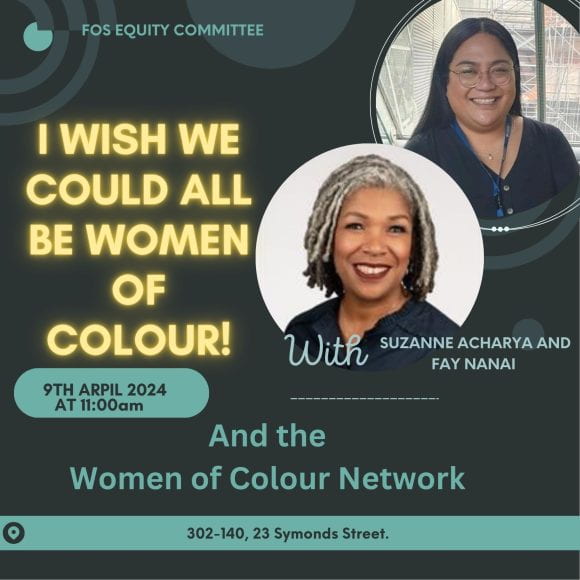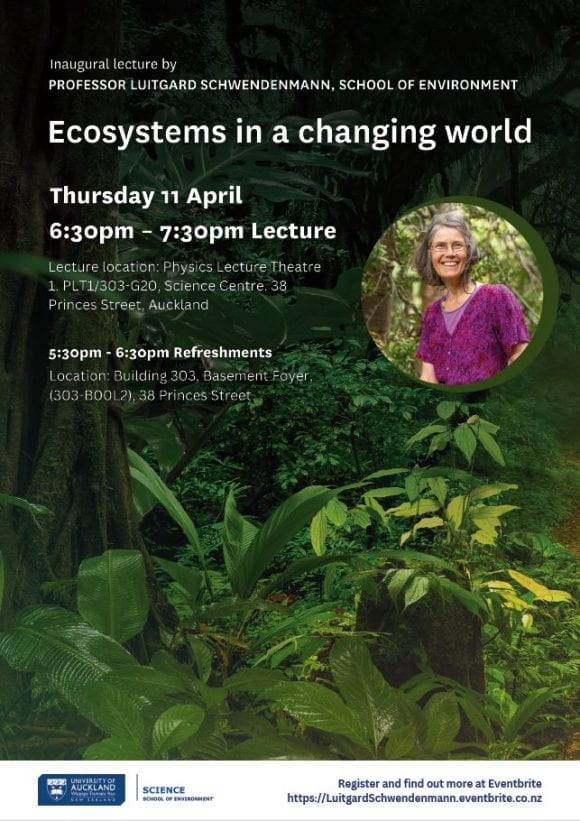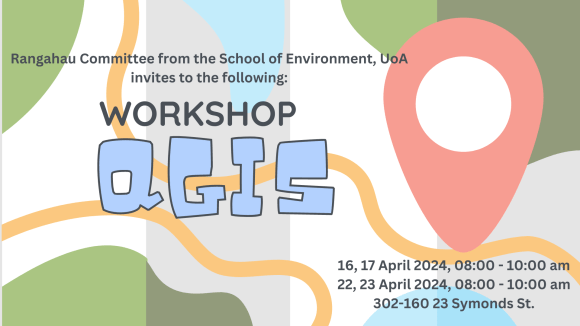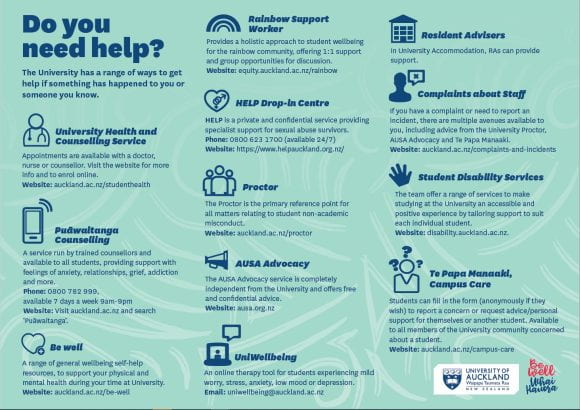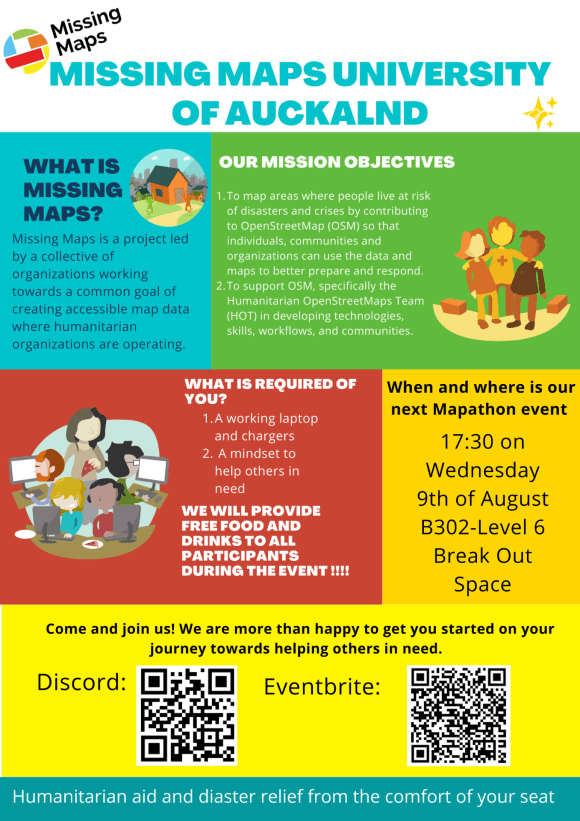Issue 144 – Tuesday 29 April 2025
HeadsUp
So soon after the Easter/Anzac/Mid-semester break, it’s a case of heads-down rather than heads-up as we move into the business-half of the semester. I hope you all were able to take at least part of the break as a bona fide break.
Some rough weather may have modified leave plans, however. And when you lead field courses, being nimble in choppy weather is the key. So all credit to George and Kevin whose PG class of 30 students had two days more on Aotea/Great Barrier than was planned for….
When I asked DHoS Tom if there were any issues I should mention but had forgotten, his reply was “no news is good news”. Indeed after a year of too much turbulence, would it be jixing things to say we are generally moving along quietly, confidently and happily? That’s certainly the impression I get as I talk to people in the corridors, at Wednesday morning tea and in ADPR conversations. Long may it last.
Its not all quiet though. At the Faculty level, Sarah Young our new Dean is working with us Heads and other senior leaders to craft a new organisational structure, with leadership and portfolios better aligned with the pou of Taumata Teitei. Those at the recent Faculty meeting would have had a foretaste of this change. Stay tuned for more.
School Initiative – The Manaaki Project Kaupapa
Sonia, Nick R and Rachel have developed a succinct statement outlining the kaupapa of the Manaaki Project. I paste it in below to underline (well, italicise!) its importance as a School-based initiative and ensure it is recognised and understood.
“The Manaaki Project (TMP) is a programme of support in the School of Environment that enables course coordinators to work with Tuākana coordinators and tutors to ensure the best outcomes for Māori and Pacific students.
TMP works to triage situations and find the best solutions so that students do not have to share their personal situations to multiple staff, and can instead focus on their coursework in a manner that suits their context. The overall aim is to support students to do their best, while recognising that some students have complex lives, and need flexibility in their assessments’ due dates, timelines, and participation on occasion.
By choosing to participate in TMP course coordinators agree to trust the process of student support which includes various check points with the Tuākana discipline coordinators, and if necessary, the Tuākana coordinator, Head of School/Deputy Academic or AD Teaching and Learning.
For the most part, this means that details of the students’ situations will not be shared with course coordinators. Therefore, it is imperative that TMP functions as a high-trust model with the student’s success as the central taumata.
This ensures our students can maintain their privacy and dignity with respect to their personal circumstances.
In practice, TMP may result in a Tuākana discipline coordinator contacting a course coordinator to ask for flexibility with respect to assessment and/or participation for a student. Ideally, the course coordinator will work with the Tuakana discipline coordinator to find a solution or outcome that supports the student’s success in the course, within the bounds of UoA assessment policy.
————–
To close, some congratulations and an opportunities
- Congratulations to Nick Lewis who has been invited to speak among a line up of other prominent thinkers in the Cook Islands next week. This aligns with his career-long commitment to the relations between education, knowledge, and nation. He sees this as “a chance to take part in an important conversation among old friends…and make a small repayment on the many benefits I’ve derived from my relationships with the Cooks”.
- Congrats too to Karen Fisher for recently being invited to join a very large and well-funded Canadian-based project titled “Transforming Chemical Risk Management with Indigenous Expertise”, which seeks to address the urgent need to reduce emissions of climate-changing gases and pollutants through innovative approaches to chemical risk management. Karen will contribute the application of Indigenous research methods to this challenge “to profoundly transform chemical risk management in Indigenous community-based practice, university labs and classes, regulatory practices, and policy development”.
Opportunities
- In case Easter treats were a bit lean this year, on Wed 14th May we have Round 1 of the Chocolate competition for 2025 sponsored by our new combined Institute of Marine Science and the School of Environment equity committee!
- As communicated in an email to all staff on 23/4/25 and on the University intranet, Te Tumu Herenga | Libraries and Learning Services is conducting an in-depth review of our electronic collections. The focus is on maintaining access to high-use and high-value resources, ensuring that the most critical materials for teaching and research remain available. Please consider providing feedback.
- Many staff have already participated in and appreciated the free staff Te Akoranga Kairangi (TAK) programme, an introduction to Māori language, culture and the Treaty. Details about the programme appear later in this addition of p-cubed. The programme runs over 8 weeks, 2 hours per weekly session, on Tuesdays or Thursdays. Fourteen 8-week cohorts are offered throughout the year, including an on-line option. [We increase and deepen our collective capacity to encounter our own place and people with integrity through engaging in opportunities like this so if you have yet to take this course, please consider doing so].
- Finally, a reminder that our colleague Phil Shane’s inaugural professorial lecture is coming up on Monday 19th I recently went to one of these occasions in FMHS for a geography colleague in that Faculty. I was amazed at the immense turnout and festive atmosphere. Let’s match that at our inaugurals this year.
So, lots actually happening, beneath the overall relief of “no news is good news” !
Robin Kearns, Head of School
Announcements, Seminars & Events
Disaster Prevention and Management Seminar Series
When: Friday 2 May, 2pm | Where: Ontology Lab 302.551

Phil Shane Inaugural Lecture
When: Monday 19 May | Link to register: https://PhilShane.eventbrite.co.nz
5pm Refreshments: Building 303, Ground Floor PLT1 Hallway, 36 Princes Street
5:30pm Lecture: Physics Lecture Theatre 1 PLT1/303-G20, Science Centre, 38 Princes Street

ENV Research Seminar Series
You are cordially invited to attend the next round of the School of Environment Seminar Series presentations, which will include presentations by:
Dr Itxaso Ruiz – Does land management affect grapevine water resources?
Dr Maurizio D’Anna – Reshaping the understanding of beach response to sea-level rise for shoreline models
When: Tuesday 20 May, 12-1pm | Where: 302.140 | Please RSVP for catering

COMPASS Morning Tea
COMPASS PG is dedicated to creating a vibrant and supportive community for postgraduate students at all levels in the School of Environment. We host regular events designed to foster collaboration, networking, and a sense of community.
All staff and postgrad students are invited to come along, to participate or just to enjoy some home baked goods!

The Great SoE Bake Off
When: 13 – 16 May, 10am everyday | Where: 5th Floor Kitchen

Te Akoranga Kairangi
The free staff programme, Te Akoranga Kairangi (TAK) is an introduction to Māori language, culture and the treaty. Details about the programme are appended. The programme runs over 8 weeks, 2 hours per weekly session, on Tuesdays or Thursdays. Fourteen 8-week cohorts are offered throughout the year, including an on-line option. Details about the schedule are appended and ALSO on Hono Learning (see instructions below).
Here are links to the details of the programme: TAK Programme and 2025 TAK times available
In addition, a free 2.5 hour Colonial History Walk around the university area is led by Assoc Prof Avril Bell. This is a unique opportunity for all staff keen to learn more about the role of central Auckland in the history of colonisation.
To enrol in TAK or the Colonial History Walk:
EITHER by emailing (we can enrol you directly)
Assoc Prof Avril Bell a.bell@auckland.ac.nz (Tuesday classes) or Prof Alison Jones a.jones@auckland.ac.nz (Thursdays classes)
OR by going to University of Auckland staff intranet webpage, search for Hono Learning. On the Hono page, type Te Akoranga Kairangi into the search bar at the top. Then click on the Te Akoranga Kairangi or Colonial History Walk link. Then click on Select Offering. There you should see a list of cohort dates for the year’s classes or walks. Select the cohort dates that suit you. Then click on Submit. You should then get an email to confirm your enrolment.
Feel free to contact Alison or Avril with any questions! 😊
Ngā mihi, thanks a lot
Alison and Avril
Hono Help
For any Hono issues, please contact Michael Groom
Rangahau
Undergraduate–Postgraduate Pairing Scholarship
This $800 scholarship supports undergraduate students to gain hands-on research experience by shadowing a postgraduate student. Undergraduates will assist with tasks like literature reviews, data analysis, and mapping, while learning valuable research skills and contributing to real projects.
Applications should include a copy of the undergraduate student’s academic transcript and a short paragraph justifying the proposed project and pairing. This is a great opportunity for collaboration, skill-building, and mentoring across levels of study.
Please email Sila (katarzyna.sila-nowicka@auckland.ac.nz) for details or with ready applications.
Health Safety & Wellbeing
As we head into winter, it is important to prepare to deal with the winter blues
Preparing yourself mentally for winter is like gently setting the stage for a slower, more inward season. It’s less about fighting the cold and more about embracing the quiet. Here’s a soulful guide to ease into it:
❄️ 1. Shift Your Expectations
- Understand that it’s okay to slow down.
- You don’t need to be at peak productivity—winter is nature’s rest season too.
🧣 2. Make Peace with Darkness
- Reframe the longer nights as time for rest, reflection, and coziness.
- Create evening rituals: reading, journaling, or listening to soft music.
🌲 3. Nourish Your Space
- Make your home feel like a sanctuary—warm lighting, calming scents, soft textures.
- Surround yourself with things that bring peace and comfort.
🫖 4. Lean into Simple Joys
- Enjoy quiet pleasures: hot drinks, winter walks, baking, old movies.
- Keep a small list of winter things you genuinely like—revisit it when days feel heavy.
🤍 5. Tend to Your Mind
- Stay aware of your emotional landscape. It’s normal to feel more introspective or low.
- Practice self-kindness. You don’t need to “fix” your mood—just care for it.
🧘 6. Anchor with Routine
- A gentle daily rhythm brings a sense of steadiness when the season feels still.
- Start and end your days with intention, even if it’s just lighting a candle or stretching.
🤝 7. Stay Connected
- Reach out, even when you feel like withdrawing. A little human warmth goes a long way.
- Make winter traditions with friends or family—even simple ones.
We would like to acknowledge the following dates:
- April 28 – World Day of Safety and Health at Work
- May 1-31 – World Smokefree May
- May 2 – World Asthma Day
- May 5 – World Hand Hygiene Day
- May 6-12 – New Zealand Sign Language Week
- May 8 – World Ovarian Cancer Day
Funding Calls
Hono data integration are impacting research projects
Do you have research grants? Do you, or a member of your research team, use EIP dashboards to monitor your research funds or Research Development Account (RDA)? If so, please read on.
Recent challenges with Hono data integration are impacting research projects. As a result, EIP dashboards are not correctly reflecting actual salary costs from 20 February, casual staff payments, or future-dated salary commitments. All other actual transactions are correct, however, the left-to-spend balances may not be correct.
What does this mean?
- EIP reports should not be used to confirm a project’s financial status until further notice, as salary details in EIP reports for pay runs after 20 Feb 2025 are not yet available.
- Research Development Account (RDA) balances may not be correct, particularly if fixed-term or casual staff are being paid from the RDA account.
- Surpluses or deficits on research grants cannot be resolved until the balances can be confirmed, so projects ending after 20 Feb 2025 cannot be closed.
- Surpluses or deficits will not be distributed to, or recovered from, RDA accounts (or returned to funders) for projects ending after 20 Feb 2025 until accurate balances can be confirmed.
Resolutions and Timeframes
A Solution Oversight Co-ordination (SOC) Team has been formed and includes a range of experts who understand the issues and the impacts. Members have been drawn from Research Services, OneFinance, HR, Integration Specialists, Vendors, the Risk Team, and the Planning and Information Office to find solutions to the identified issues. Alongside the SOC Team, several continuity groups (including a research continuity group) are working on specific outcomes, the teams meet daily and report to SOC. The Solution Oversight Coordination Team are in the process of identifying and quantifying the risks around these and implementing mitigation strategies.
Please be assured we’ll be providing regular progress updates to the Faculties and Institutes. In the meantime, if you have an urgent query related to your project financials, please contact your Faculty or Institute Research Services Team in the first instance.
ECR Career Exploration Workshops
We are excited to open applications for Early Career Researchers (ECR) to join ECR Career Exploration Workshops, a dedicated space for early career researchers (including final year PhD candidates) to reimagine their career paths and explore opportunities within and beyond academia.
This two-part workshop is designed to help you reflect on your values, strengths, and career possibilities while providing practical guidance on researching and navigating diverse career paths.
Workshop Details:
Dates: Tuesday, May 6 & Tuesday, May 13 (participants must attend both sessions) | Location: Building 201- Room 317 (Arts and Education, City Campus)
Two Cohort Options:
- Morning Group: 9:00 AM – 12:00 PM
- Afternoon Group: 1:00 PM – 4:00 PM
Pre-Workshop Commitment:
Participants will receive a digital pre-workshop workbook, requiring approximately four hours to complete. While not mandatory, this prework is highly recommended as it will help you reflect on your skills, aspirations, and career context before the sessions.
How to Apply:
To ensure a meaningful and engaged group, we ask applicants to submit the following via this link https://forms.office.com/r/0bGLSECf6P before the 28th of April.
- A short paragraph explaining what you hope to gain from this workshop
- A link to your up-to-date LinkedIn profile or Discovery page
Spaces are limited, so we encourage you to apply early. Please direct any questions to researcherdevelopment@auckland.ac.nz
Faculty of Science Commercial Seed Funding – Call for Applications
The Faculty of Science announces our next funding round for development of commercially-focused research and capability. Projects of up to $10k may be funded, and must be completed during 2025.
The aim is to support early-stage work that will make a difference to the tech development pathway. A range of commercial R&D or skill development activities could be supported, including experiments to determine whether a particular idea is commercially feasible, development of initial proof-of-concept results for commercial funding applications, IP and Freedom to Operate searches, or market research. Researchers may also apply for this funding to support their personal development (commercial and entrepreneurial skills).
The application should be well thought-out and indicate why the project is promising, but:
- Very early-stage projects can be funded;
- Emerging researchers are particularly encouraged to apply; and
- There is low administrative overhead, with the application limited to 2 pages in length.
Projects which involve collaborative research with industry, rather than development of in-house IP, should instead consider the new NZ Product Accelerator Industry Collaboration funding, which accepts applications on an ongoing basis.
Application process and deadline: Applicants should submit a proposal via email to FoS-researchadmin@auckland.ac.nz. The application deadline is Friday, 9th May 2025, at 12 noon. The application (max. 2 pages including references) should address the topics on the application form (downloaded from the webpage below).
Webpage: Commercialisation Seed Funding – The University of Auckland
2025 Tāwhia te Mana Research Fellowships Support Package: Q&A Insights Session
Please join us for the 2025 Tāwhia te Mana Research Fellowships Q&A Insights session on Monday, 12 May 2025 from 11:00am to 12:15pm.
The Domestic Portfolio in the Research Funding team will be hosting a 1-hour session with past Tāwhia te Mana Research Fellowships winners and previous panellists to share their insights and advice on applying for the Tāwhia te Mana Research Fellowships.
Questions are encouraged and can be sent in advance to: submissions@auckland.ac.nz.
AUDIENCE: Open to UoA research staff applying for the 2025 Tāwhia te Mana Research Fellowships round, and research support staff (FIRST).
Key information:
- Date: Monday, 12 May 2025
- Time: 11:00am – 12:15pm
- Location: Building 260, Seminar room 310 (Decima Glen), 12 Grafton Road, City Campus
Registration Link: https://www.eventbrite.co.nz/e/tawhia-te-mana-fellowships-qa-insights-session-12-may-2025-tickets-1310870070669?aff=oddtdtcreator
A Calendar Event invitation will be sent out to participants when the registration has been completed.
Spencer Foundation – Research Grants on Education: Large
The Large Grant supports education research projects that will contribute to the improvement of education, broadly conceived, with budgets ranging from US $125,000 to $500,000 for projects ranging from one to five years.
This program is “field-initiated,” meaning that proposal submissions are not in response to a specific request for a particular research topic, discipline, design, or method. Goal for this program is to support rigorous, intellectually ambitious and technically sound research that is relevant to the most pressing questions and compelling opportunities in education.
- Value: between US$125,000 and US$500,000 (circa NZ$ 220,000 -880,000)
- Duration: 12 – 60 months
- Deadlines: Intent to apply. External Deadline – Wednesday 14 May 2025; Internal Deadline – Monday 9 June, 2025 (12 Noon)
- Funder webpage:
Natural Hazards Commission Toka Tū Ake 2026 Biennial Research Funding Programme
NHC Toka Tū Ake invites researchers and practitioners to submit proposals for Biennial grants that align with their updated Research Strategy and Research Investment Priorities Statement 2025.
There have been a number of changes since the last round, so please take some time to familiarise yourself with these. Please visit the funders website for links to the relevant documents, guidelines and application templates.
- Value: $50,000 – $100,000
- Duration: maximum 2 years
- EOI Internal Deadline: 12pm, Tuesday 20 May 2025
2025 New Zealand – China Strategic Research Alliance
The New Zealand – China Strategic Research Alliance (SRA) is an annual joint funding programme funded by New Zealand and the Chinese Ministry of Science and Technology (MoST). Chinese partners must apply for their own funding through MoST.
For 2025, proposals must align with the priority area of Environmental Technologies. The specific research areas for this priority are:
- Clean and renewable energy technologies
- Climate change adaptation technologies
- Climate change mitigation technologies
- Carbon dioxide capture and conversion technologies
- Novel technologies for biodegradation or elimination of emerging pollutants in vivo
- Grant value: Up to NZ $300,000
- Duration: Up to 3 years
- Internal Deadline: 12 noon, Monday, 23 June 2025
Guidelines and resources can be found on the MBIE website
Publications
Oliver, P., Kearns, R., & Wills, P. (2025). ‘Waiheke is a community not a commodity’: Residents’ right and kaitiakitanga in tourism ‘hot spots’. In Justice in Tourism Destinations : Avenues for Destination Governance and Management. Eds Torabian, P and Albrecht, J.N.. Routledge, London & New York. pp 35-65
Castree, N., Barnes, T. & Salmond, J. (eds) (2025) Making Geography Matter: The past and present of a changing discipline (London: Routledge) https://www.routledge.com/Making-Geography-Matter-The-Past-and-Present-of-a-Changing-Discipline/Castree-Barnes-Salmond/p/book/9781032380513?srsltid=AfmBOoo3mep8Uwuu2zoD78ltxcbU4v8iOj4VnCv4PuV_sSj92juo7GyA
Agnew, J., Yeung, H., Salmond, J.A., Cox, K.R. 2024 Can Arguing for a Unified Geography Strengthen the Divisions It Seeks to Dissolve? Book review forum: Geography Indivisible (2023) Environment and Planning F 10.1177/26349825241276579
Salmond, J and Brierly, G (2025) Embracing and enacting critical and constructive approaches to teaching critical physical geography (Invited chapter). In Lane, S. and Lave, R (ed.) Field guide to mixing social and biophysical methods in environmental research (open access) https://www.openbookpublishers.com/books/10.11647/obp.0418
Ma, X., Zou, B., Gao, J., Deng, J., Wang, X., Wu, H., Xu, X., Wang, Y., Tan, Z., Jiang, N., Shen, Y., Li, D., Gao, J., Fan, Y., Salmond, J.A., Morawska, L. 2025 ‘Towards Compliance with the 2021 WHO Air Quality Guidelines: A Comparative Analysis of PM2.5 Trends in Australia and China’ Environment International, Volume 198, 2025,10937 https://doi.org/10.1016/j.envint.2025.109378.
Rindelaub, J., Salmond, J.A., Fan, W., Miskelly, G., Dirks, K., Henning, S., Conrath, T., Stratmann, F., Coulson, G., 2025 ‘Aerosol mass concentrations of microplastics at a remote coastal location in New Zealand’ Environmental Pollution Volume 372, 2025, 126034, https://doi.org/10.1016/j.envpol.2025.126034.













